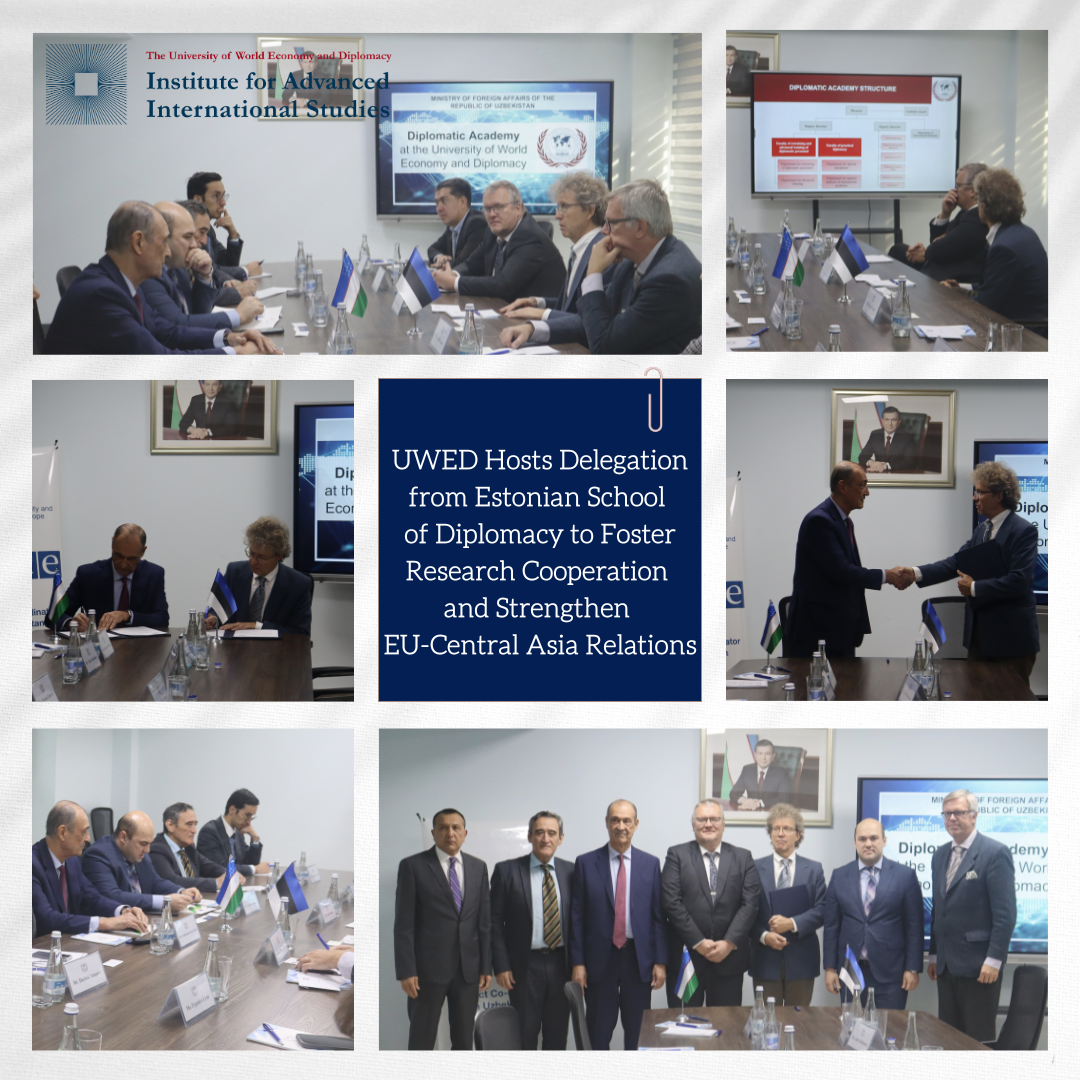
In a significant stride towards enhancing diplomatic education and research collaboration, representatives from the University of World Economy and Diplomacy (UWED), the Diplomatic Academy, and the Institute for Advanced International Studies (IAIS) welcomed a distinguished delegation from the Estonian School of Diplomacy. The meeting included esteemed guests such as the Director of the Estonian School of Diplomacy, Ekke Nõmm, and expert Taavi Tomm, alongside the Head of the OSCE Project Co-ordinator in Uzbekistan, Ambassador Antti Karttunen, and OSCE National Project Officer, Mirza-Ulugbek Abdullaev. Representing UWED were Akram Umarov, First Vice-Rector for Academic Affairs; Ambassador Abdusamat Khaydarov, Director of the Diplomatic Academy; Timur Rakhimov, Deputy Director; Durbek Amanov, Head of Department at the Diplomatic Academy and Head of the Centre for European Studies at IAIS; and Mushtariy Usmonova, Research Fellow at IAIS. The meeting served as a platform to explore avenues for educational cooperation, research collaboration, and dialogue on strengthening diplomatic ties between Central Asia, Estonia, and the broader European Union.
The meeting commenced with a warm welcome from Akram Umarov, who expressed his gratitude to the guests for their ongoing cooperation and their planned contribution to a series of lectures aimed at enriching the academic environment of UWED. He highlighted the significance of such engagements in fostering an international outlook among students and faculty, thus contributing to the broader objectives of diplomatic training.
Following this, Ambassador Khaydarov provided an insightful overview of the Diplomatic Academy’s training programmes, detailing its core objectives and the strategic direction of its academic initiatives, emphasising the Academy’s commitment to cultivating a new generation of diplomats equipped with the skills to navigate the complexities of international relations, especially in the context of evolving geopolitical landscapes.
The delegation from Estonia shared valuable insights into the operations and educational frameworks of the Estonian School of Diplomacy. Ekke Nõmm, along with Taavi Tomm, spoke about the institution’s approach to diplomatic training, emphasising its focus on practical skills, policy analysis, and fostering a deep understanding of international law and global affairs. Both sides noted the striking similarities in their institutional missions and aspirations, underscoring the potential for synergies in academic and research exchanges.
A key focus of the discussions was the exploration of opportunities for deepening Estonia-Central Asia and EU-Central Asian relations. The dialogue centred on identifying areas where collaborative efforts could be expanded, particularly in the realms of policy research, diplomatic training, and capacity-building initiatives.
Ambassador Antti Karttunen expressed his strong support for furthering academic and diplomatic partnerships. He emphasised the OSCE’s readiness to facilitate greater connections between UWED and international institutions, recognising the value of these collaborations in promoting mutual understanding and cooperation.
Durbek Amanov took the opportunity to highlight the role of the IAIS, particularly its Centre for European Studies, in advancing research on EU-Central Asia relations. He outlined potential areas for cooperation, including joint research projects, academic exchanges, and collaborative conferences aimed at addressing shared challenges and opportunities in the region.
The meeting culminated in the signing of a Memorandum of Understanding (MoU), symbolising a commitment to strengthen academic and research ties between the participating institutions. This agreement is expected to facilitate greater cooperation in areas such as student and faculty exchanges, joint research initiatives, and collaborative training programmes, thereby contributing to the professional development of future diplomats and international relations experts.
The meeting concluded with an agreement to continue dialogues and explore additional avenues for collaboration. The delegations expressed optimism about the potential for future seminars, joint workshops, and research projects that would not only benefit their respective institutions but also contribute to a greater understanding of international diplomacy in the context of EU-Central Asian relations.